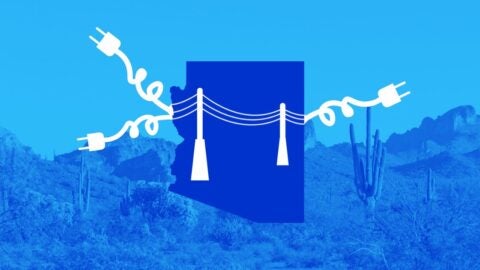EPA SmartWay and Clean Truck Standards Save U.S. Businesses Millions
(This post originally appeared on EDF+Business)
 American businesses benefit tremendously from the robust voluntary and regulatory programs of the U.S. Environmental Protection Agency. These programs are now under threat of massive budget cuts and regulatory rollbacks. In the coming weeks and months, the experts at EDF+Business will examine what a weakened EPA means for business.
American businesses benefit tremendously from the robust voluntary and regulatory programs of the U.S. Environmental Protection Agency. These programs are now under threat of massive budget cuts and regulatory rollbacks. In the coming weeks and months, the experts at EDF+Business will examine what a weakened EPA means for business.
It’s safe to say that the EPA isn’t having the best week. Whether it was new administrator Scott Pruitt vowing to slash climate and water protections at CPAC or this week’s reveal that President Trump wants to slash a reported 24 percent of its budget, the EPA has taken a beating recently. However, what may not be as obvious is that slashing EPA’s budget and reducing funding to key programs actually hurts businesses that have greatly benefitted from EPA programs.
A key example of how the EPA bolsters business is freight. In the freight world, the EPA has done a lot for companies’ bottom lines while protecting human health and that of the planet. Companies seeking to reduce freight costs and achieve sustainability goals across supply chains receive immense value from the EPA. Two key programs that provide this value are the U.S. EPA SmartWay program and the Heavy-Duty Truck Greenhouse Gas Program.
A compelling value proposition for business
SmartWay was created in 2004 as a key part of the Bush Administration’s approach to addressing clean energy and climate change. The program has grown from fifteen companies at its start to nearly 4,000 companies today. The program attracts strong private sector participation because it offers a clear and compelling value proposition: freight shippers gain access to information that enables them to differentiate between freight carriers on emissions performance.
This saves shippers money and cuts carbon emissions. Freight carriers participate in the program to gain access to large shippers, such as Apple, Colgate-Palmolive and Target.
The EPA SmartWay program is not only a popular program that is delivering billions of dollars of annual savings to the U.S. economy, it is also a core strategy for companies to reduce their freight emissions. The agency has calculated that since 2004, SmartWay partners have saved:
- 8 million metric tons of carbon emissions
- Over 7 billion gallons of fuel
- $24.9 billion in fuel costs
To put it in perspective, the reduction of 72.8 million tons of emissions is roughly the equivalent to taking 15 million cars off the road annually. The $25 billion in aggregate savings from this one program is more than three times the annual budget of the entire EPA.
Given the strong value proposition of the program, it is no surprise that many companies with existing science-based targets on climate emission reductions participate in EPA SmartWay, including: Coca-Cola Enterprises, Dell, Diageo, General Mills, Hewlett Packard Enterprise, Ingersoll-Rand, Kellogg Company, Nestlé, PepsiCo, Procter & Gamble Company and Walmart.
Clean fuel driving a healthy U.S. economy
Another key program that is saving companies billions is the Heavy-Duty Truck Greenhouse Gas Program. This program supports long-term cost savings and emission reductions through clear, protective emission standards with significant lead time.
The first generation of this program, running from 2014 to 2017, was finalized in August 2011 and will cut oil consumption by more than 20 billion gallons, save a truck’s owner up to $73,000, deliver more than $50 billion in net benefits for the U.S. economy, and cut carbon dioxide pollution by 270 million metric tons.
The program was created with the broad support of the trucking industry and many other key stakeholders. Among the diverse groups that supported the standards were the American Trucking Association, Engine Manufacturers Association, Truck Manufacturers Association, and the United Auto Workers. The industry has embraced the new and improved trucks too.
The success of the first generation effort spurred the agency to launch a second phase that was finalized in August 2016. This effort stands to be a major success as well. The program is estimated to save:
- 1.1 billion metric tons of carbon pollution
- 550,000 tons of nitrous oxides and 32,000 tons of particulate matter (aka: harmful air pollutants)
- 2 billion barrels of oil
- $170 billion in fuel costs
This latest phase is also big hit with leading companies. More than 300 companies called for strong final standards during the rulemaking process, including PepsiCo and Walmart (two of the largest trucking fleets in the U.S.), mid-size trucking companies RFX Global and Dillon Transport, and large customers of trucking services General Mills, Campbell’s Soup, and IKEA. Innovative manufacturers, equipment manufacturers, and freight shippers have also called for strong standards.
The corporate support for these standards was so impressive that the New York Times issued an editorial illustrating a rare agreement on climate rules.
Every company that sells goods in the market benefits immensely from these two programs and many others from the U.S. EPA. Programs like EPA SmartWay and the Heavy Truck Greenhouse Gas Standards are saving companies and consumers billions of dollars annually, and are integral to corporate efforts to cut carbon emissions.
Looking ahead
In his remarks to EPA employees on his first day on the job, Pruitt acknowledged that “we as an agency and we as a nation can be both pro-energy and jobs and pro-environment…we don’t have to choose”. My hope is that this is a signal of open mindedness to a path forward would allow further improvements to the environment and the economy rather than roll-backs on vital programs and protections.
Perpetuating the belief that the EPA and business are at odds will not only hurt the environment, but would endanger American prosperity.












